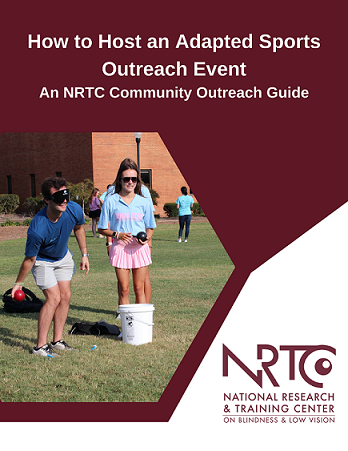The NRTC is excited to introduce its latest community outreach guide, "How to Host an Adapted Sports Outreach Event." This free, comprehensive resource is aimed at assisting organizations, professionals, or anyone interested in adapted sports to foster inclusive recreation for people with blindness or low vision (B/LV) and for participants to gain insight into what playing a sport looks like for someone with B/LV.
The guide includes photos and activity set-up tips from the NRTC’s adapted sports event, “Play Without Limits: Adapting Sports and Games for the Blind,” to help readers visualize what an adapted sports event can look like. We’ve compiled a list of linked resources, promotion tips, and step-by-step instructions for anyone aspiring to organize an event like this in their community.
A Blueprint for Inclusive Engagement

The adapted sports guide emphasizes the universal right to participate in and enjoy the benefits of physical activities. It presents resources on a variety of sports that can be adapted to accommodate individuals with B/LV, including running, biking, hiking, swimming, tennis, basketball, and soccer. The guide also explains what sports work best for an event, what supplies you’ll need, and how to implement each adapted sport. Helpful tips are in different sections of the guide in case readers need more resources or information.
The guide also includes a section on general event considerations for anyone unfamiliar with event planning. Readers can learn about how to consider their budget for an event, how many volunteers they need to recruit, and how to structure activities so that everything can flow smoothly on the day of the event.
Education is a central theme of the guide. It aims to enlighten the audience on the importance of physical activity and provides information on how people who are B/LV can participate in sports at all levels, from recreational to professional. To educate participants, the guide has a section on how to create an informational booth with videos that demonstrate how people with B/LV play more intense adapted sports, like beep baseball and goalball.
Strengthening Community Ties Through Sports
An adapted sports event can also serve as an excellent platform for strengthening community partnerships. By linking up with local educational institutions, community recreation centers, organizations focusing on disabilities, and local businesses, an event like this can significantly enhance the visibility of the services offered by the organizing body. This can lead to greater community support, increased funding, volunteer participation, and a heightened interest in B/LV.
The aim is to cultivate a more inclusive environment by educating the community and fostering collaborations with other organizations. This collaborative approach is key to creating recreational programs that are accessible and enjoyable for everyone. As a result, gaps that exist in community recreational programs may be addressed.
The NRTC focuses on employment outcomes of people with blindness or low vision (B/LV), providing training, technical assistance, and resources for professionals and people with B/LV interested in employment through funding from the National Institute on Disability, Independent Living, and Rehabilitation Research grant #90RTEM0007. To learn more, visit our About page and the NTAC-BLV website.